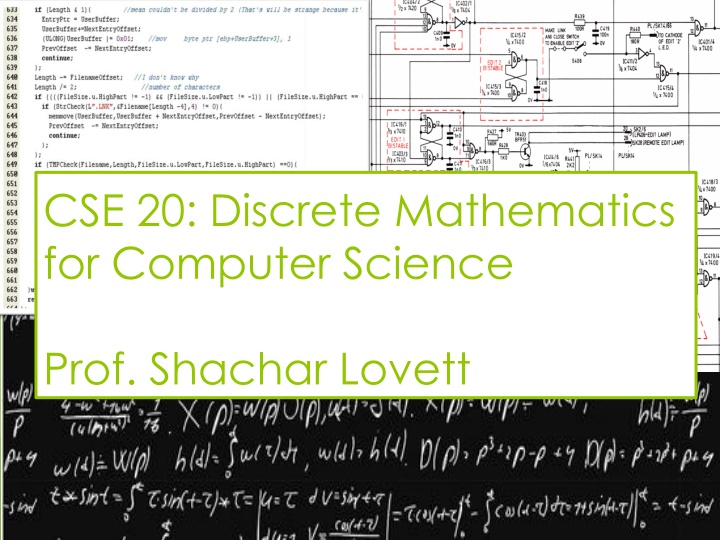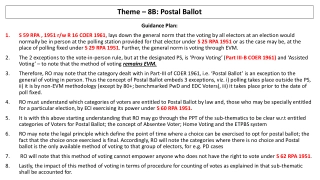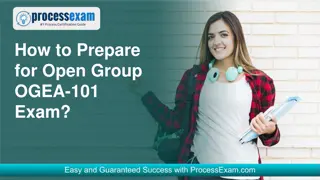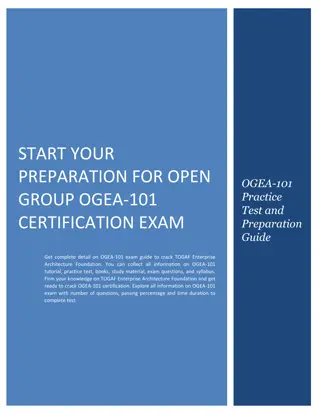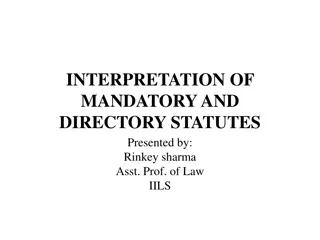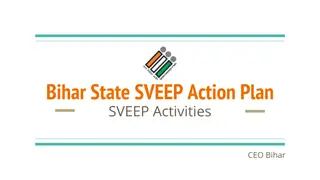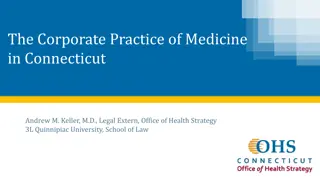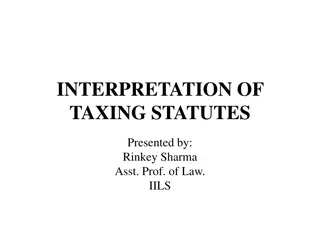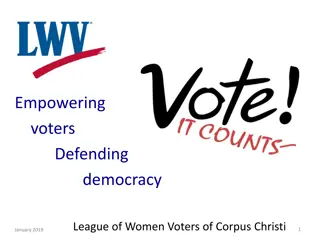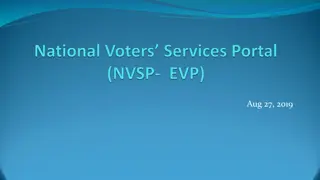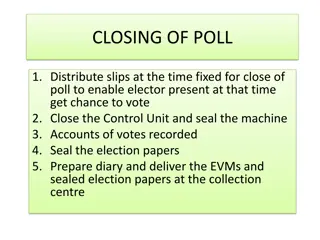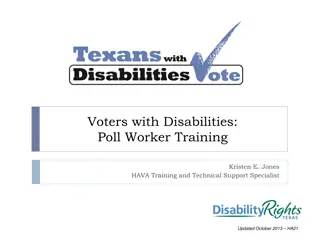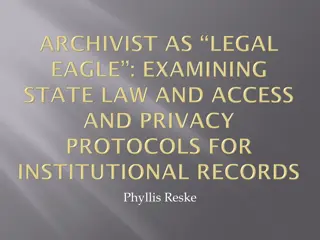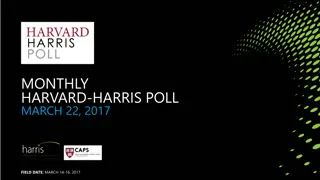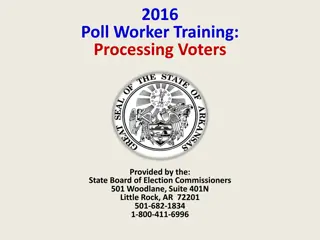New Registrars of Voters Training 101: Connecticut General Statutes Overview
This content provides an overview of the Connecticut General Statutes relating to the appointment and duties of registrars of voters, deputy registrars, assistant registrars, and special assistant registrars. It explains the procedures for filling vacancies in the registrar's office and the powers and responsibilities of deputy and assistant registrars in the electoral process.
Download Presentation

Please find below an Image/Link to download the presentation.
The content on the website is provided AS IS for your information and personal use only. It may not be sold, licensed, or shared on other websites without obtaining consent from the author.If you encounter any issues during the download, it is possible that the publisher has removed the file from their server.
You are allowed to download the files provided on this website for personal or commercial use, subject to the condition that they are used lawfully. All files are the property of their respective owners.
The content on the website is provided AS IS for your information and personal use only. It may not be sold, licensed, or shared on other websites without obtaining consent from the author.
E N D
Presentation Transcript
CSE 20: Discrete Mathematics for Computer Science Prof. Shachar Lovett
2 Today s Topics Introduce myself to you Course structure and procedures 3. Introduce Discrete Mathematics 1. 2.
3 Who Am I? Shachar Lovett, faculty at CSE Research: Algorithms and complexity What do I do? Find new ways to design algorithms And understand why sometimes we cant
4 Class basics: your grade Final: 40% (must pass to pass the class) Midterm: 30% (best out of two) Homework: 20% Activities in textbook: 5% (both participation and challenge activities) Participation in class (i-clicker): 5%
5 What do I do in class? Think of me as your tutor Be your guide in inducing you to explore concepts Create situations and pose problems that set the scene for yourexploration Answer your questions Notspend lecture reading the textbook to you with slightly different words
What do you do before class? Read the relevant chapters in the online textbook Answer all the interactive question in the textbook ( reading quiz ) Come prepared with any questions that you may have
7 What do you do in class? (before class, you prepared yourself by reading the textbook and answering the reading quizzes) I ask a question You first answer it by yourself Then discuss in assigned groups of 3-4 students Like a jury, you must come to a unanimous decision Answer the question a second time I will ask groups to share their insights, and I will provide additional clarification as needed 1. 2. 3. 4.
Have you used clickers before? A. Yes B. No C. Maybe
9 But professor, wouldn t it be more efficient if you just taught us the right answer to begin with? Have you ever heard of an aerobics class where the instructor did all the exercises at the front of class, while the class just watched attentively? Me neither. To learn, you must do the work with your own muscle (your brain).
10 What do you do in this course? Prepare your brain for maximum in-class learning Reading, interactive quizzes In class: engage with your neighbors and the class, engage with the ideas Turn them upside down and sideways, think about what common errors or misconceptions might be Seek help and seek to help others In class, forums, office hours, discussion section I expect each class member to contribute to an environment of mutual aid and cooperation
11 Tips for a good group discussion Take turns being the first one to talk Once you all agree on the answer, don t stop! Always go over each wrong answer and explain why it is wrong Also interesting and useful to think about why somebody might be tempted to choose it how was the professor hoping to trick somebody by including that wrong answer? Even if your group-mate has said something very clearly and correctly, it s a good idea to repeat it yourself So, what I think you said was, Might seem pointless, but your brain will remember better if YOU say it too
12 Rules for what you do in this course Textbook activities (participation + challenge): Yes: Open book, though being able to answer without a book is a good sign You can retry a question if you answer incorrectly, and you can take as much time as you need Complete them individually No: Sharing answers is as inappropriate as sharing answers on an in-class exam don t do it
13 Rules for what you do in this course Homework Homework should be solved in groups of 3-4 students Use forums to post advertisements looking for groups, or announcing group availability Example: Hey a bunch of us are in S&E library right now until about midnight if anyone wants to join us. Expect homework to be hard. This is the best preparation for midterm / final
Class website http://cseweb.ucsd.edu/classes/fa16/cse20-a/ http://cseweb.ucsd.edu/classes/fa16/cse20-b/ Same Contain all the information you need to know about the class
Textbook We will use an online textbook from Zybooks: http://www.zybooks.com/ Sign in, use the code: UCSDCSE20LovettFall2016 Contains: Reading material Participation + Challenge activities (which I sometimes call reading quizzes ) Need to do these before every class
Optional extra study help Essentials of Discrete Mathematics by David J. Hunter, 2nd edition Pretty similar to zybooks Discrete Mathematics with Applications by Susanna Epp Very verbose, can be good if you like detailed explanations and examples
18 Discussion forums We use Piazza for discussion forums: http://piazza.com/ucsd/fall2016/cse20 We set up two discussion forums: One for all your questions One for scheduling group study You should already be registered; if not, let me know
19 Homework We use Gradescope for homework submissions: https://gradescope.com/courses/4402 Homework is done in groups of 3-4 students Can change groups b/w homeworks No collaboration outside groups is allowed Submit only one homework per group You should already be registered; if not, register with your UCSD email and code M458W9
20 In class participation We use i-clicker for in-class participation (any version of i-clicker should work fine) Register your clicker at https://www1.iclicker.com/register-clicker/ (otherwise I cannot associated your clicker ID with you, and you won t gain any participation points )
I dont know if you already noticed But I have an accent Nothing I can do about it, but it might make it harder for you to understand me (in particular as the topics we learn will be new to you) Some solutions: Everything I say is recorded: https://podcast.ucsd.edu/ All the slides are available in the class website If you don t understand something, don t wait come to office hours. Sometimes one small clarification can make all the difference.
What is Discrete Mathematics? Training in the mathematical techniques and ways of thinking that you will need to succeed in a CSE major, and as a computer programmer We ll spend a great deal of time focusing on logic Logical thinking Hardware logic Programming logic Logical argument and proof
Relations to future classes Prepares you for nearly all future classes, eg CSE100 (data structures), CSE101 (algorithms), CSE105 (computability), as well as more domain specific classes (compilers, databases, etc) In all of them, you will need to be able to argue formally why something works or doesn t work. The goal of this class is to teach you how to do so.
Logical reasoning It makes all other progress and innovation possible! It saves us from scenes like this: Sarah's Certain Death Riddle https://www.youtube.com/watch?v=2dgmgub8mHw We will look at logic from a highly formal, mathematical perspective that allows us to be much more accurate than just what makes sense Many things that we can discover with proof and logic are very counter-intuitive! We have to rely on our formal approach, not just intuition about what seems to make sense
Analogy to algebra 2x + 6 ?= 2 (x + 3) How do we know these are equal? A. We can try out several values of x, like 3, -3, 1.3333 and see that both sides are equal (have to be sure to try weird /different examples not just obvious ones) We can try every single value of x and check that both sides are equal C. Other/None/More than one B.
28 Thought of the Week To be a good geek you have to have both humility and arrogance in equal measures. The humility is so you ll admit you don t know something and get help/read the docs/etc. The arrogance is the bit that says I don t know that now but I can and I will soon. --Thomas Beagle, IT/programmer
